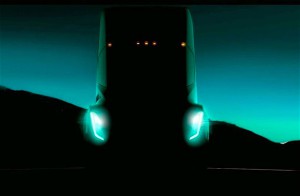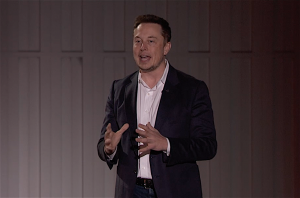
Set to be revealed next month, Tesla's new semi-truck is expected to get between 200 and 300 miles on a single charge.
Tesla CEO Elon Musk revealed recently the company planned to unveil a semi-truck in September, adding it would be capable of handling long-haul loads.
Apparently, he forgot to add “just barely.”
The new truck, which Musk has implied in the past would be on par with current trucks or better. However, a new Reuters report reveals that the new truck will be capable of 200 to 300 miles on a charge. Most long-haul trucks can go 1,000 miles before refueling.
“As long as (Musk) can break 200 miles he can claim his truck is ’long haul’ and he will be technically right,” Sandeep Kar, chief strategy officer of Toronto-based Fleet Complete, which tracks and analyzes truck movement, told Reuters.
(Tesla’s new semi-truck is likely to be autonomous. For the story, Click Here.)
However, it may not be necessary for Tesla’s truck to be capable of that kind of distance initially. Kar notes that as much as 30% of trucking is regional with distances of 100 to 200 miles, moving freight from ports to nearby cities or to other transportation hubs.
Apparently, Tesla’s truck doesn’t feature a sleeper cab, which would not be necessary if the company is focused on a regional hauler rather than a full-on long haul model. However, Musk said the performance and handling is second to none.
He described a recent test drive in the truck as “whipping around” the test track. Additionally, it comes with autonomous driving capability.
(Click Here for details about Teamsters push into shaping autonomous truck rules.)
The EV maker recently inquired about conducting real-world testing in Nevada, according to the company’s testing permit application with the Nevada Department of Motor Vehicles.
The company’s new truck can move in “platoons” that follow a lead vehicle, much like Volvo’s autonomous truck. It will be ready in September, as Musk said in the tweet from April. The advantage to this kind of vehicle is that it cuts down on the need for drivers.
Tesla isn’t just looking to test in Nevada, according to Reuters, it will be meeting with officials in California to discuss autonomous testing there as well. DMV spokeswoman Jessica Gonzalez Tesla said that the DMV was not aware of the level of autonomy in the trucks.
(Tesla’s had trucks in the portfolio plan for some time. For the story, Click Here.)
The testing in Nevada would be different than existing programs for other companies, like Daimler AG’s Freightliner subsidiary, where there are drivers behind the wheel in the event of a problem. Tesla’s “platoon” set up would mean there are trucks without operators in the cab. Nevada has not signed off on any testing.

